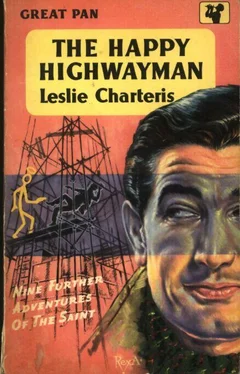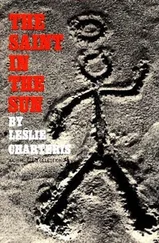Leslie Charteris - The Happy Highwayman
Здесь есть возможность читать онлайн «Leslie Charteris - The Happy Highwayman» весь текст электронной книги совершенно бесплатно (целиком полную версию без сокращений). В некоторых случаях можно слушать аудио, скачать через торрент в формате fb2 и присутствует краткое содержание. Год выпуска: 1939, ISBN: 1939, Издательство: Published, Жанр: Детектив, на английском языке. Описание произведения, (предисловие) а так же отзывы посетителей доступны на портале библиотеки ЛибКат.
- Название:The Happy Highwayman
- Автор:
- Издательство:Published
- Жанр:
- Год:1939
- ISBN:9789997508058
- Рейтинг книги:4 / 5. Голосов: 1
-
Избранное:Добавить в избранное
- Отзывы:
-
Ваша оценка:
- 80
- 1
- 2
- 3
- 4
- 5
The Happy Highwayman: краткое содержание, описание и аннотация
Предлагаем к чтению аннотацию, описание, краткое содержание или предисловие (зависит от того, что написал сам автор книги «The Happy Highwayman»). Если вы не нашли необходимую информацию о книге — напишите в комментариях, мы постараемся отыскать её.
American version.
The Happy Highwayman — читать онлайн бесплатно полную книгу (весь текст) целиком
Ниже представлен текст книги, разбитый по страницам. Система сохранения места последней прочитанной страницы, позволяет с удобством читать онлайн бесплатно книгу «The Happy Highwayman», без необходимости каждый раз заново искать на чём Вы остановились. Поставьте закладку, и сможете в любой момент перейти на страницу, на которой закончили чтение.
Интервал:
Закладка:
"Does it matter?" asked the Saint lightly, and Sardon's face seemed to flame at him.
"It matters. That is only another thing which we can learn from the ant — that individual profit and ambition should count for nothing beside more enduring good. Listen. When I was a boy I loved small creatures. Among them I kept a colony of ants. In a glass box. I watched them in their busy lives, I studied them as they built their nest, I saw how they divided their labour and how they lived and died so that their common life could go on. I loved them because they were so much better than everyone else I knew. But the other boys could not understand. They thought I was soft and stupid. They were always tormenting me. One day they found my glass box where the ants lived. I fought them, but there were so many of them. They were big and cruel. They made a fire and they put my box on it, while they held me. I saw the ants running, fighting, struggling insanely—" The hushed voice tightened as he spoke until it became thin and shrill like a suppressed scream. "I saw them curling up and shrivelling, writhing, tortured. I could hear the hiss of their seething agony in the flames. I saw them going mad, twisting — sprawling — blackening — burning alive before my eyes —"
"Uncle!"
The quiet voice of the girl Carmen cut softly across the muted shriek in which the last words were spoken, so quietly and normally that it was only in the contrast that Simon realized that Sardon had not really raised his voice.
The wild fire died slowly out of Sardon's eyes. For a moment his face remained set and frozen, and then, as if he had only been recalled from a fleeting lapse of attention, he seemed to come awake again with a slight start.
"Where was I?" he said calmly. "Oh yes. I was speaking about the intelligence of ants… It is even a mistake to assume, because they make no audible sounds, that they have not just as excellent means of communication as ourselves. Whether they share the telepathic gifts of other insects is a disputed point, but it is certain that in their antennae they possess an idiom which is adequate to all ordinary needs. By close study and observation it has even been possible for us to learn some of the elementary gestures. The work of Karl Escherich…"
He went into details, in the same detached incisive tone in which he had been speaking before his outburst.
Simon Templar's fingers stroked over the cloth, found a crumb of bread and massaged it gradually into a soft round pellet. He stole a casual glance at the girl. Her aloof oval face was pale, but that might have been its natural complexion; her composure was unaltered. Sardon's outburst might never have occurred, and she might never have had to interrupt it. Only the Saint thought that he saw a shadow of fear moving far down in her eyes.
Even after Carmen had left the table, and the room was richening with the comfortable aromas of coffee and liqueur, brandy and cigars, Sardon was still riding his hobbyhorse. It went on for nearly an hour, until at one of the rare lulls in the discussion Nordsten said: "All the same, Doctor, you are very mysterious about what this has to do with your own experiments."
Sardon's hands rested on the table, white and motionless, the fingers spread out.
"Because I was not ready. Even to my friends I should not like to show anything incomplete. But in the last few weeks I have disposed of my uncertainty. Tonight, if you like, I could show you a little."
"We should be honoured."
The flat pressure of Sardon's hands on the table increased as he pushed back his chair and stood up.
"My workshops are at the end of the garden," he said, and blew out the four candles.
As they rose and followed him from the room, Nordsten touched the Saint's arm and said in a low voice: "Are you sorry I Dr.agged you out?"
"I don't know yet," answered the Saint soberly.
The girl Carmen rejoined them as they left the house. Simon found her walking beside him as they strolled through the warm moonlight. He Dr.opped the remains of his cigar and offered his cigarette case; they stopped for a moment while he gave her a light. Neither of them spoke, but her arm slipped through his as they went on.
The blaze of lights which Sardon switched on in his laboratory wiped the dim silvery gloom out of their eyes in a crash of harsh glaring illumination. In contrast with the tasteful furnishings of the house, the cold white walls and bare tiled floor struck the Saint's sensitive vision with the hygienic and inhuman chill which such places always gave him. But Sardon's laboratory was not like any other place of that kind in which he had ever been.
Ranged along the walls were rows of big glass-fronted boxes, in which apparently formless heaps of litter and rubble could be dimly made out. His tye was caught by a movement in one of the boxes, and he stepped up to look at it more closely. Almost in the same moment he stopped, and nearly recoiled from it, as he realized that he was looking at the largest ant that he had ever seen. It was fully six inches long; and, magnified in that proportion, he could see every joint in its shiny armour-plated surface and the curious bifurcated claws at the ends of its legs. It stood there with its antennae waving gently, watching him with its bulging beady eyes…
"Tetramorium cespitum," said Dr. Sardon, standing beside him. "One of my early experiments. Its natural size is about three tenths of an inch, but it did not respond very well to treatment."
"I should say it had responded heroically," said the Saint. "You don't mean you can do better than that?"
Sardon smiled.
"It was one of my early experiments," he repeated. "I was then merely trying to improve on the work of Ludwig and Ries of Berne, who were breeding giant insects almost comparable with that one, many years ago, with the aid of red light. Subsequently I discovered another principle of growth which they had overlooked, and I also found that an artificial selective cross-breeding between different species not only improved the potential size but also increased the intelligence. For instance, here is one of my later results — a combination of Oecophylla smaragdina and Prenolepsis imparis."
He went to one of the longer and larger boxes at the end of the room. At first Simon could see nothing but a great mound of twigs and leaves piled high in one corner. There were two or three bones, stripped bare and white, lying on the sandy floor of the box… Then Sardon tapped on the glass, and Simon saw with a sudden thrill of horror that what had been a dark hole in the mound of leaves was no longer black and empty. There was a head peering out of the shadow — dark bronze-green, iridescent, covered with short sparse bristly hairs…
"Oecophylla is, of course, one of the more advanced species," Sardon was saying, in his calm precise manner. "It is the only known creature other than man to use a tool. The larvae secrete a substance similar to silk, with which the ants weave leaves together to make their nests, holding the larvae in their jaws and using them as shuttles. I don't yet know whether my hybrid has inherited that instinct."
"It looks as if it would make a charming pet, anyway," murmured the Saint thoughtfully. "Sort of improved lap dog, isn't it?"
The faint sly smile stayed fixed on Sardon's thin lips. He took two steps further, to a wide sliding door that took up most of the wall at the end of the laboratory, and looked back at them sidelong.
"Perhaps you would like to see the future ruler of the world," he said, so very softly that it seemed as if everyone else stopped breathing while he spoke.
Simon heard the girl beside him catch her breath, and Nordsten said quickly: "Surely we've troubled you enough already—"
Читать дальшеИнтервал:
Закладка:
Похожие книги на «The Happy Highwayman»
Представляем Вашему вниманию похожие книги на «The Happy Highwayman» списком для выбора. Мы отобрали схожую по названию и смыслу литературу в надежде предоставить читателям больше вариантов отыскать новые, интересные, ещё непрочитанные произведения.
Обсуждение, отзывы о книге «The Happy Highwayman» и просто собственные мнения читателей. Оставьте ваши комментарии, напишите, что Вы думаете о произведении, его смысле или главных героях. Укажите что конкретно понравилось, а что нет, и почему Вы так считаете.












